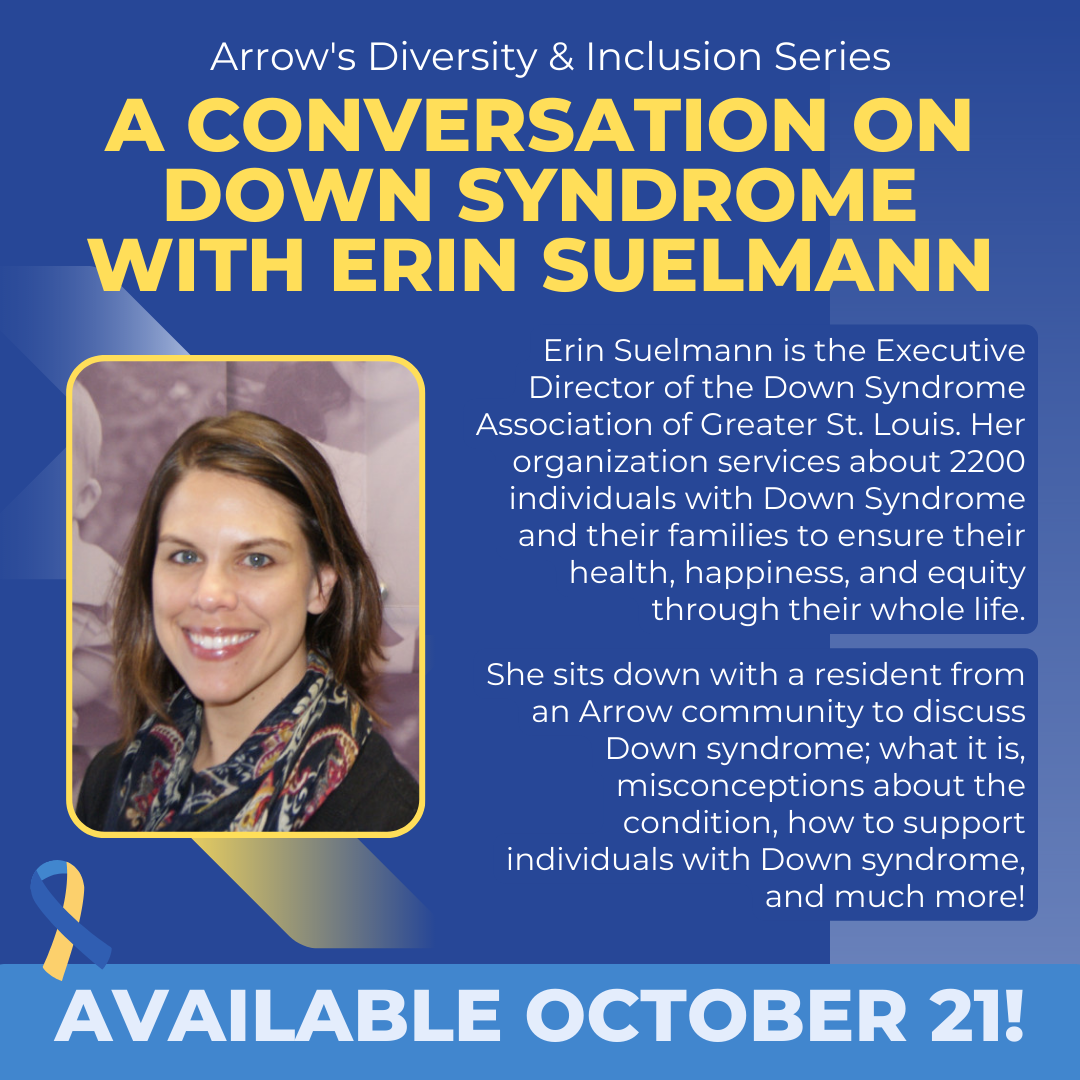
October 21, 2023
To recognize Down Syndrome Awareness Month in October, we invited Erin Suelmann to talk with Arrow resident Teresa Saunders. Suelmann is the Executive Director of the Down Syndrome Association of Greater St. Louis. Her organization services about 2,200 individuals with Down syndrome and their families to ensure their health, happiness, and equity through their whole life.
First fully described in the 1860s by Dr. John Langdon Down, Down syndrome is a genetic condition caused by a third copy of the 21st chromosome, resulting in physical, intellectual, and developmental delays. It occurs in approximately 1 in 700 live births, making it the most frequently occurring genetic condition. It’s caused by an error in cell division, so the cause, if any, is unknown. It occurs at conception and so is unrelated to anything that happens during pregnancy. It is seen in children from all backgrounds. The only factor linked to an increased chance of having a child with Down syndrome is advanced maternal age.
The Down Syndrome Association encourages the use of people-first language (for example, “a child with Down syndrome” vs “a Down syndrome child” or a “Down’s kid”). Down syndrome is a fact of life for the child and family, so it is important to use emotionally neutral expressions (don’t say “I’m so sorry,” or that they are “afflicted with” or “suffers from” Down syndrome).
Suelmann discussed two misconceptions about people with Down syndrome: The lack of ability to learn and be independent. Most people with Down syndrome have mild to moderate intellectual disability and need additional time or unique teaching strategies to learn math and reading, for example. There’s also the assumption that people with Down syndrome won’t be able to go to college, live on their own, have a job, or marry. In fact, Suelmann says “it is our community that is creating barriers,” not the individual’s capabilities. “We need to think about reshaping our community to make things more accessible for people with disabilities.”
Down syndrome is related to a variety of unique health challenges, one of which is advanced aging. As recently as the 80s, people with Down syndrome were only living into their twenties. Around that time, Saunders received her nursing license. She described how children and teens with Down syndrome were institutionalized in a psychiatric hospital. Much has changed in the intervening decades. Now that we are devoting energy and resources to the special health needs of people with Down syndrome, life expectancy is in the sixties and there’s focus on finding meaningful, dignified work for people with disabilities.
If you have a relative having a child with Down syndrome, celebrate and congratulate them as you would any new addition to the family. You may want to ask if they’ve been in touch with the Down Syndrome Association as they can be a great support. Suelmann says to set high expectations for the child. Don’t start their life off by believing that they won’t be capable, but rather, that they have great things ahead of them.
For the full conversation, click here.
Saint Charles, Missouri-based Arrow Senior Living manages a portfolio of communities that offer varying levels of care, including independent living, assisted living, and memory care. Each and every senior living community supports residents by focusing on dignity, respect, and quality of life. The programs and amenities offered are selected to provide only the highest standard of quality and comfort.
Find an Arrow community near you
Work at Arrow Senior Living